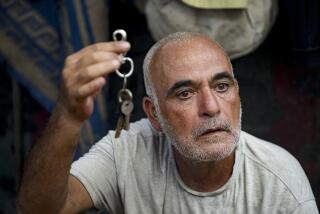Family Makes a Nerve-Racking Escape from Iraq
- Share via
With tension and confusion escalating in Baghdad, where 500 American citizens remain stranded, Dr. Ghazi Shaba made his decision: His family would try to escape Iraq by making a marathon bus ride across the desert to the Jordan border.
Fifteen hours later, having endured nerve-racking searches and questioning by Iraqi soldiers, the San Diego County family crossed the border safely, among the first Americans to be allowed out of Iraq or Kuwait during the current Persian Gulf crisis.
Shaba, his wife, Edna, and sons, Namir, 12, and Steven, 11, entered Jordan on Wednesday. They took a flight from the capital of Amman on Saturday to Belgrade, Yugoslavia, and then Los Angeles. They arrived at their Jamul home early Sunday.
“We took a risk getting on that bus, but I knew we had to take the chance. I made the decision even though we didn’t know what would happen on the road from minute to minute,” said Shaba, a physician with Kaiser Permanente in San Diego.
“It was frightening, very confusing. We were praying constantly to get across the border,” he said.
Shaba’s successful odyssey is tinged with sadness: His parents, who live in Baghdad, are ill. After a joyous reunion in mid-July, their first meeting in 18 years, Shaba knows he probably will not see them again.
“We went to visit my parents and to vacation, but then everything turned very confusing,” he said. “It was very emotional, leaving my parents again after 18 years. We were very upset.”
U.S. officials continue efforts to get more Americans out of Iraq and neighboring Kuwait, which was invaded and annexed by Iraq on Aug. 2. Some Americans, mostly relatives of diplomats and members of the U.S. Embassy, arrived in Jordan over the weekend after battling the same frustration the Shaba family faced in getting permission to leave Iraq.
Other vehicles carrying Americans and other foreign citizens from Baghdad have been turned back by Iraqi authorities at the Jordan-Iraq border. More than 500 American citizens remain in Baghdad and another 3,000 in Kuwait. The U.S. government does not yet consider the remaining Americans to be hostages.
After months of planning to visit relatives in Iraq--both Shaba and his wife were born there and moved to the United States two decades ago--the Shabas arrived in Baghdad on July 16. The Iraqi government announced Aug. 2 that a coup had occurred in Kuwait and that Iraqi troops had been invited to cross its border, Shaba said. A news blackout was imposed in Baghdad.
“We couldn’t get any news from the outside, any Western news,” Shaba said. “We didn’t learn until a few days later what was happening.”
When he began to understand the extent of the crisis, Shaba said, he called the U.S. Embassy in Baghdad and was warned to leave immediately.
Use of roads and airports was limited. Foreigners were faced with confusing and rapidly changing restrictions on who could leave the country, Shaba said. Iraqis and Kuwaitis--now considered under Iraqi jurisdiction since the annexation--were not allowed to leave the country.
“Arab nationals were turned back. Some (foreigners) could leave if you had been in the country for less than one month, but two days later that changed, and you had to have an exit visa,” Shaba said. “It was very confusing.”
On Wednesday, after days of contacting the Iraq government and U.S. Embassy, Shaba heard a rumor that Italian and Japanese tourists had been allowed to cross the Jordanian border. That night, he got his family on a bus for a 600-mile bus ride through the desert to that border crossing.
During the 15-hour drive along the desolate road, Iraqi soldiers stopped them at least two dozen times, boarding the bus with guns to inspect passports and baggage and question the passengers, Shaba said. There was no food and little water.
“It was not a relaxing escape. It was like a James Bond movie, very frightening. We didn’t know what would happen in the next mile,” he said.
At the border, there were more inspections and interrogations, and at one point it seemed that Shaba’s wife and children would be allowed to pass without him. But Shaba said he and his wife were able to converse in Arabic with the soldiers, smoothing the way for their crossing.
“We used our common sense in talking with them. I kept persuading them. The soldiers were hostile to some Americans, but we were treated very well,” he said.
Now that the emotional ordeal of the escape is over, his family remains concerned about their relatives in Baghdad, Shaba said. All Iraqi men ages 16 to 55 are being drafted, and residents are worried as the military crisis worsens, he said.
“People are carrying on with their lives, but they don’t know what is going to happen,” he said.
More to Read
Sign up for Essential California
The most important California stories and recommendations in your inbox every morning.
You may occasionally receive promotional content from the Los Angeles Times.













